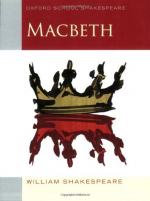|
This section contains 6,106 words (approx. 21 pages at 300 words per page) |

|
Lisa Hopkins, Sheffield Hallam University
In her epic novel on the life of Macbeth, King Hereafter, Dorothy Dunnett suggests that one of the primary reasons for the eventual failure of her hero's kingship is his inability to be perceived as sufficiently charismatic: 'a diverse people in time of hardship need a priest-king. The English know that. Edward is anointed with holy oil: he has the power of healing, they say'.1 Although Dunnett's Macbeth-figure—an Orkney jarl also known as Thorfinn—is very differently conceived from Shakespeare's, each shares an unfortunate tendency towards the mundane. Most particularly, Shakespeare's hero and his wife both, at certain crucial moments of their lives, strongly favour a low-key, occasionally almost bathetic vocabulary.2 This aspect of their characterization has been much mocked in the English comic and popular tradition: Bertie Wooster is continually amused by the concept of the cat i' th' adage, and...
|
This section contains 6,106 words (approx. 21 pages at 300 words per page) |

|


